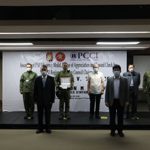NANAWAGAN ang Philippine Chamber of Commerce and Industry (PCCI), ang pinakamalaking business organization sa bansa, sa mga bangko at iba pang non-bank financial institutions (NBFIs) para sa pagpapalawig ng loan maturities na naka-due mula March 16, 2020 hanggang December 31, 2020, ng hindi bababa sa isang taon para matulungan ang mga kompanya na malagpasan ang lockdown at suspensiyon ng business operation,na halos dalawang buwan nang umiiral.
Sa isang statement, ibinahagi ni PCCI President Amb. Benedicto V. Yujuico ang tumitinding pagkabahala ng mga miyembro ng PCCI sa kanilang sumasamang cash positions at lumiliit na kakayahan na umiwas sa malawakang lay-offs dahil sa pagpapatupad ng Enhanced Community Quarantine (ECQ).
“The ECQ has brought substantially all businesses to a sudden and unexpected stop. Many are now facing economic distress, forcing them to resort to drastic cost-cutting, lay-offs and pay cuts. Even as the government slowly relaxes the quarantine measures, we expect that the effects of this crisis will continue to be felt and that businesses will continue to struggle through the end of 2020,” wika ni Yujuico
Umaapela para sa suporta ng mga bangko at NBFIs, ipinaliwanag ng PCCI na nahihirapan na ang mga industriya, micro, small, medium enterprises (MSMEs) at maging ang malalaking kompanya na pangalagaan ang kanilang liquidity at tustusan maging ang most basic operating expenses.
“Creditor willingness to restructure loans maturing in 2020 will most certainly go a long way toward preserving employment, and averting permanent closure of many long-time clients and ‘partners’ of banks. Without the support of Philippine banks and other NBFIs, many businesses will likely be forced to shut down,” apela ni Yujuico.
Ayon sa PCCI, ang mga sumusunod na industriya ay nasa high risk:
1. Transportation, Logistics, and Storage. Air, land, and water transport dahil sa patuloy na paghihigpit sa flights at/o trips.
2. Wholesale and Retail Trade, Repair of Motor Vehicles and Motorcycles. Retailers (tulad ng department stores, petroleum outlets, at iba pang retail stores na hindi itinuturing na essential) dahil ang mga negosyong ito ay posibleng higpitan kahit sa post-ECQ. Posibleng bumagsak ang benta dahil bibigyang prayoridad ng mga consumer ang essential items at maraming restrictions ang maaaring ipatupad ng pamahalaan sa post-lockdown. Maraming consumers ang posibleng piliin na ipagpatuloy ang pag-quarantine sa kanilang mga sarili. Ang retail petroleum ay nasa high risk din dahil sa pagbagsak ng oil prices at pagbaba ng demand
3. Arts, Entertainment, Leisure, and Recreation. Leisure related sub-industries (Gambling and Betting Activities, Sports Activities and Amusement and Recreation Activities) dahil ang social distancing at stay-at-home orders para sa karamihan ay magpapatuloy matapos ang ECQ.
4. Hotels, Resorts, Other Types of Accommodation and Food Services Activities dahil ang social distancing at stay-at-home orders para sa karamihan ay magpapatuloy matapos ang ECQ at mananatiling sarado ang mga ito.
5. Real Estate Activities lalo na yaong malaki ang kinalaman sa leisure related sectors at tinatarget ang low-income segment.
6. Mining and Quarrying. Extraction of Crude Petroleum and Natural Gas sub-industry (and related Mining Support Service Activities) sanhi ng pagbagsak ng presyo ng krudo at ng pagbaba ng demand.
7. Manufacturing. Sub-industries na may kinalaman sa discretionary products dahil mas bibigyang prayoridad ng mga consumer ang essential items:
Manufacture of Textiles, Manufacture of Wearing Apparel, Manufacture of Leather and Related Products.
Manufacture of Coke and Refined Petroleum Products dahil sa pagbaba ng presyo ng krudo at mas mababang demand.
Manufacture of Motor Vehicles, Trailers and Semi-trailers and Manufacture of Other Transport Equipment. Nasa high risk ito dahil maaaring umiral pa rin ang limitadong paggalaw kahit matapos ang Enhanced Community Quarantine (ECQ).
8. Construction. All sub-industries. Ang construction business, para sa karamihan, ay nahinto sa panahon ng ECQ. Matapos ang lockdown, may winners at losers dahil maaaring mag-iba ng prayoridad ang gobyerno para sa infrastructure program nito. Maraming real estate companies ang nagbawas ng proyekto na inilunsad noong nakaraang taon.
9. Financial and Insurance Activities. Insurance companies with substantial exposure to personal/health depending on the magnitude of the COVID-19 deaths/hospitalization.
10. Professional, Scientific and Technical Activities. Ang Architecture and Engineering Activities; Technical Testing and Analysis sub-industry ay maaaring nasa high risk dahil sa posibleng paghinto ng construction activities.
Ang Advertising and Market Research ay maaari ring nasa high risk dahil sa cost cutting initiatives ng karamihan sa mga kompanya.
11. Administrative and Support Services Activities. Related sub-industries, tulad ng such Travel Agency, Tour Operator, Reservation Service and Related Activities, dahil sa social distancing at stay-at-home orders.
12. Other Community, Social & Personal Activities. Ang mga kaugnay na sub-industries ay nasa high risk dahil ang social distancing at stay-at-home orders para sa karamihan ay magpapatuloy matapos ang ECQ.
Umaasa ang PCCI na makokonsidera ang kanilang kahilingan upang maibsan ang matinding hambalos ng COVID-19 sa maraming negosyo.










Comments are closed.